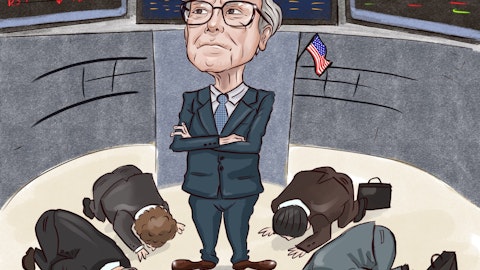Miller/Howard Investments, an investment management firm, published its first quarter 2021 investor letter – a copy of which can be downloaded here. Miller/Howard’s Infrastructure Strategy remains well-positioned to capitalize on momentum toward value and income stocks. The strategy has a yield over twice that of the S&P 500 and is trading well-below the broader market’s EV/EBITDA. You can view the fund’s top 5 holdings to have a peek at their top bets for 2021.
Miller/Howard Investments, in its Q1 2021 investor letter, mentioned Verizon Communications Inc. (NYSE: VZ), and shared their insights on the company. Verizon Communications Inc. is a New York, New York-based telecommunications company that currently has a $236.4 billion market capitalization. Since the beginning of the year, VZ delivered a -2.81% return, while its 12-month gains are up by 0.79%. As of June 15, 2021, the stock closed at $57.29 per share.
Here is what Miller/Howard Investments has to say about Verizon Communications Inc. in its Q1 2021 investor letter:
“We sold Verizon (VZ) based on concerns over how much they might spend in ongoing spectrum auctions. Management may legitimately view spending billions of dollars to expand their spectrum holdings as necessary, but we believe the payoff will be slow and will make it challenging to grow the dividend at a good pace.”

hin255/Shutterstock.com
Our calculations show that Verizon Communications Inc. (NYSE: VZ) does not belong in our list of the 30 Most Popular Stocks Among Hedge Funds. As of the end of the first quarter of 2021, Verizon Communications Inc. was in 69 hedge fund portfolios, compared to 67 funds in the fourth quarter of 2020. VZ delivered a 2.43% return in the past 3 months.
Hedge funds’ reputation as shrewd investors has been tarnished in the last decade as their hedged returns couldn’t keep up with the unhedged returns of the market indices. Our research has shown that hedge funds’ small-cap stock picks managed to beat the market by double digits annually between 1999 and 2016, but the margin of outperformance has been declining in recent years. Nevertheless, we were still able to identify in advance a select group of hedge fund holdings that outperformed the S&P 500 ETFs by 115 percentage points since March 2017 (see the details here). We were also able to identify in advance a select group of hedge fund holdings that underperformed the market by 10 percentage points annually between 2006 and 2017. Interestingly the margin of underperformance of these stocks has been increasing in recent years. Investors who are long the market and short these stocks would have returned more than 27% annually between 2015 and 2017. We have been tracking and sharing the list of these stocks since February 2017 in our quarterly newsletter.
At Insider Monkey, we scour multiple sources to uncover the next great investment idea. For example, an activist hedge fund wants to buy this $26 biotech stock for $50. So, we recommended a long position to our monthly premium newsletter subscribers. We go through lists like the 10 best battery stocks to pick the next Tesla that will deliver a 10x return. Even though we recommend positions in only a tiny fraction of the companies we analyze, we check out as many stocks as we can. We read hedge fund investor letters and listen to stock pitches at hedge fund conferences. You can subscribe to our free daily newsletter on our homepage.
Disclosure: None. This article is originally published at Insider Monkey.





